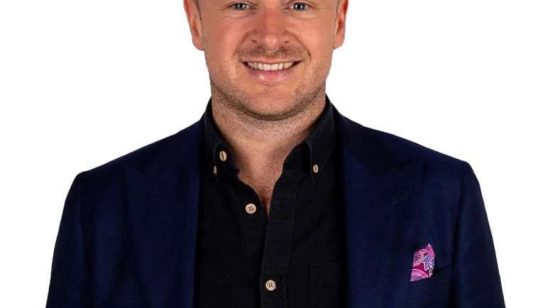
Mark Rocket: The first Kiwi in space
From playing in a band called Planet Blue to working at an internet startup named Planet, the clues to Mark Rocket’s future were always hiding in plain sight. Now, the Christchurch entrepreneur has become the first New Zealander to travel to space. He sat down with Metropol deputy editor Tamara Pitelen to talk about space as key to solving our biggest problems.
When Christchurch man Mark Rocket floated above the Earth and gazed into the vast blackness of space, he was overwhelmed – not by fear but by awe.
“You see black space in photos,” he says, “but to actually see the blackness of space was overwhelming. “The stark fragility of our small planet, travelling through this endless blackness… it gives you an emotional response. I wasn’t expecting that.”
On 31 May 2025, Mark blasted off aboard Blue Origin’s New Shepard, a sleek reusable spacecraft funded by Amazon founder Jeff Bezos, with five other ‘space trippers’. The 11-minute suborbital flight reached 105 kilometres above Earth, just past the Kármán line, which is the internationally recognised boundary of space. Mark became the first Kiwi to cross it.
To boldly go
The spacecraft experience was more visceral than he imagined. “You’re on board for half an hour while they do the final checks. Then there’s the 10-second countdown, a total cliché but still great, and you take off,” he says. “At first, it’s like a smooth elevator ride, then it just gets faster. You’re hitting 3400 kilometres an hour – faster than a bullet. I found myself clutching the seat tighter as we accelerated. You really feel like you’re riding a controlled explosion to space.”
Was he questioning his life choices and silently praying to his maker? “I had a few moments of ‘what the heck am I doing?’ but it’s something I’d always dreamed about. It was very intense, an incredible experience.”
When the engines cut off, the crew unbuckled and floated weightlessly. “It’s like swimming underwater without the water,” he says. “You can easily tumble and float. I needed a few seconds to shift from the adrenaline rush of the ascent phase to the stillness of zero gravity once the booster separated.”
Looking out of the capsule’s oversized windows, the vastness of space truly hit. “One of the other passengers spent the whole time staring out, he was overwhelmed by the blackness.”
While ticket prices are confidential (Mark signed an NDA so his lips are sealed), rumour has it that a seat costs USD $1 to 4 million.
A 2021 auction seat fetched USD $28 million. Even applying requires a USD $150,000 deposit.

From garage bands to aerospace
So how did Mark Rocket, born in Christchurch on 31 December 1970 (“exactly 10 years before Richie McCaw”), end up on a spaceflight? After high school, he skipped university and headed for Europe with a backpack and guitar, working in pubs and picking fruit. He returned home, went on the dole, and formed Planet Blue, a local band. A few months later, Mark landed a job at one of the country’s first internet companies – called Planet – thanks to a government job subsidy scheme. Can you see a theme here?
From there, he rode that early dotcom wave, founding successful digital agency Avatar in 1998. He also cofounded Rocket Lab, a company that put the Southern Hemisphere’s first private rocket into space. Going himself, though, remained the dream, so much so that he legally changed his surname to Rocket.
Today, Mark is the founder and CEO of Kea Aerospace, a Christchurch company developing solar-powered, high-altitude aircraft that gather real-time Earth observation data. These uncrewed aerial vehicles (UAVs) can fly for months in the stratosphere, providing valuable insights for agriculture, environmental monitoring, disaster response and more.
“At the moment, Canterbury only gets high-res aerial images every few years,” he says. “That’s not enough. Our aircraft can deliver updates every few weeks – that’s a game-changer.”
Kea recently received MBIE funding for a NASA-aligned coastal monitoring project. “Our exclusive economic zone covers four million square kilometres. These aircraft can help with illegal fishing, drug smuggling, maritime awareness, even search and rescue.”
Further down the line, the company’s technology could support applications such as forestry, precision farming, and secure telecommunications. “If there’s a major fire, for example, we can use infrared sensors to locate hotspots fast. That’s the kind of real-world impact we’re aiming for.”
As president of Aerospace New Zealand, Mark’s also focused on industry growth. “We’ve got incredible engineering talent coming out of the University of Canterbury but we weren’t keeping them here. We’re building companies that give people a reason to stay in the South Island.”
Sustainable spacefaring
Mark’s vision of a space-enabled future is one of hope and sustainability. “Why are we digging up the Coromandel and other precious places when we could mine asteroids and the moon? We have near-infinite solar energy out there.
“I believe it’s the ultimate IQ test for a species – to rise beyond its home planet and live sustainably in space. I see a future where humanity uses the resources of our solar system and becomes multi-planetary. If we can live sustainably in space, we can live more sustainably on Earth.”
When he’s not shaping aerospace strategy, Mark runs marathons. “My goal is one a year. I’ve done Christchurch, Queenstown, Auckland, Wellington, and Dunedin. Running helps keep me grounded. Everyone needs something to balance life’s intensity. I feel good when I know I’m marathon fit.” From local gigs and early dotcoms to orbiting Earth and leading the country’s aerospace future, Mark Rocket’s journey is, fittingly, out of this world.
“That’s the next great step,” he says. “And I want Canterbury and New Zealand to be part of it.”
Fly me to the moon
- So you want to go to space? Be prepared to dig deep… or be famous.
- Estimated cost: USD $1 to 4 million
- Minimum deposit: USD $150,000 (refundable)
- Highest price paid: USD $28 million (2021 auction)
- Free seats: Occasionally offered to special guests – it helps if your name is William Shatner or Katy Perry


Fun facts about Mark Rocket
- Born Mark Stevens on 31 December 1970 in Christchurch, Mark legally changed his surname to ‘Rocket’ in 2003 to reflect his space ambitions.
- First Kiwi in space: Flew aboard Blue Origin’s New Shepard NS 32 suborbital mission on 31 May 2025, reaching beyond the 100km Kármán line.
- Internet entrepreneur: Founded two internet companies in 1998; sold one (New Zealand Tourism Online) in 2006 to Telecom Yellow Pages.
- Early Rocket Lab backer: Seed investor and co director of Rocket Lab from 2007 to 2011. Remains a shareholder.
- Founded Kea Aerospace in 2018, based in Christchurch, developing solar-powered, stratospheric UAVs for Earth observation.
- CEO of Kea Aerospace, which achieved a milestone flight in February 2025, flying its Kea Atmos UAV to 56,000 ft for over eight hours.
- President of Aerospace New Zealand (also known as Aerospace Christchurch), supporting NZ’s aerospace ecosystem and talent retention.
- On leaving high school, he wanted to be a Buddhist monk.





